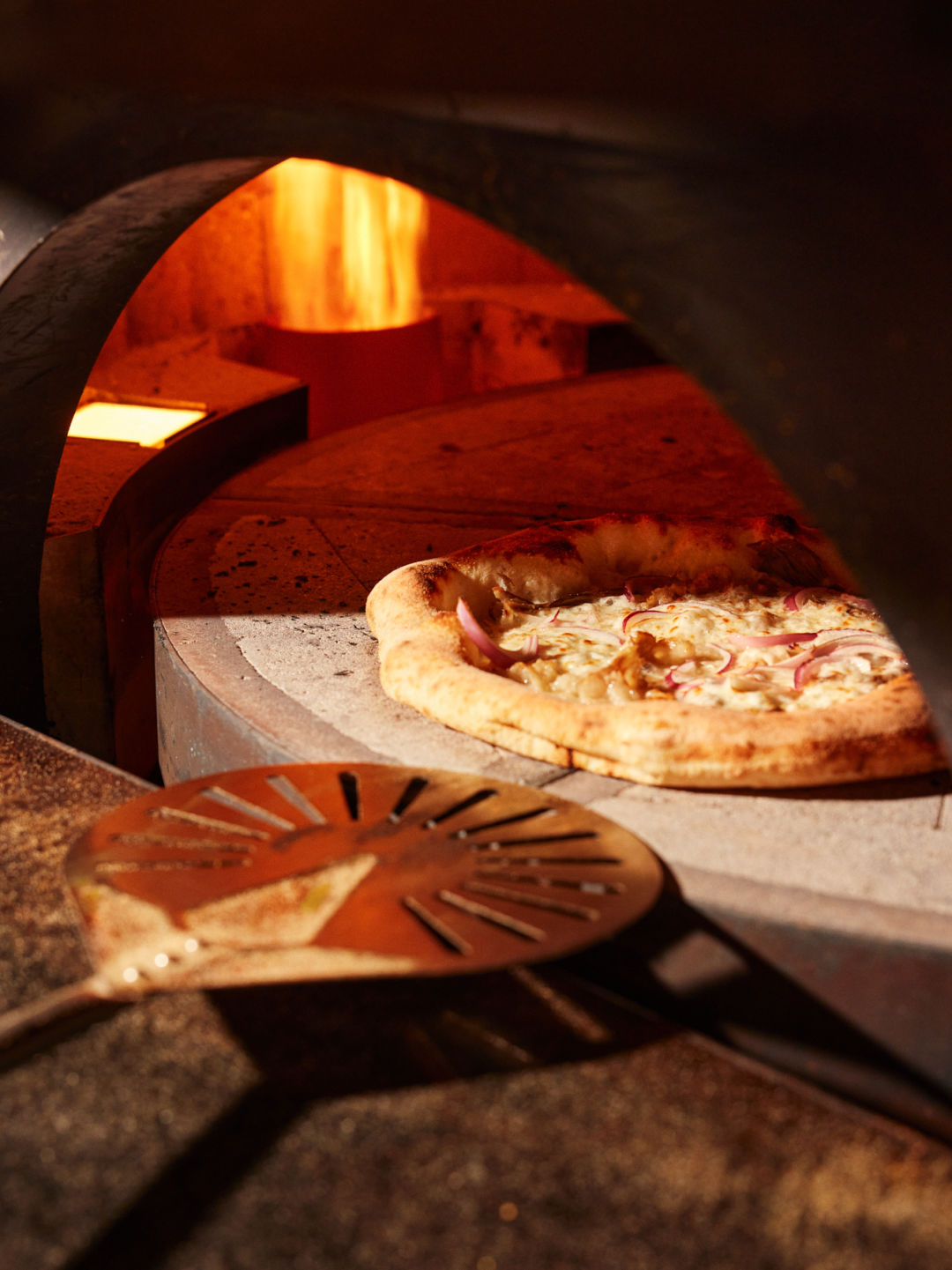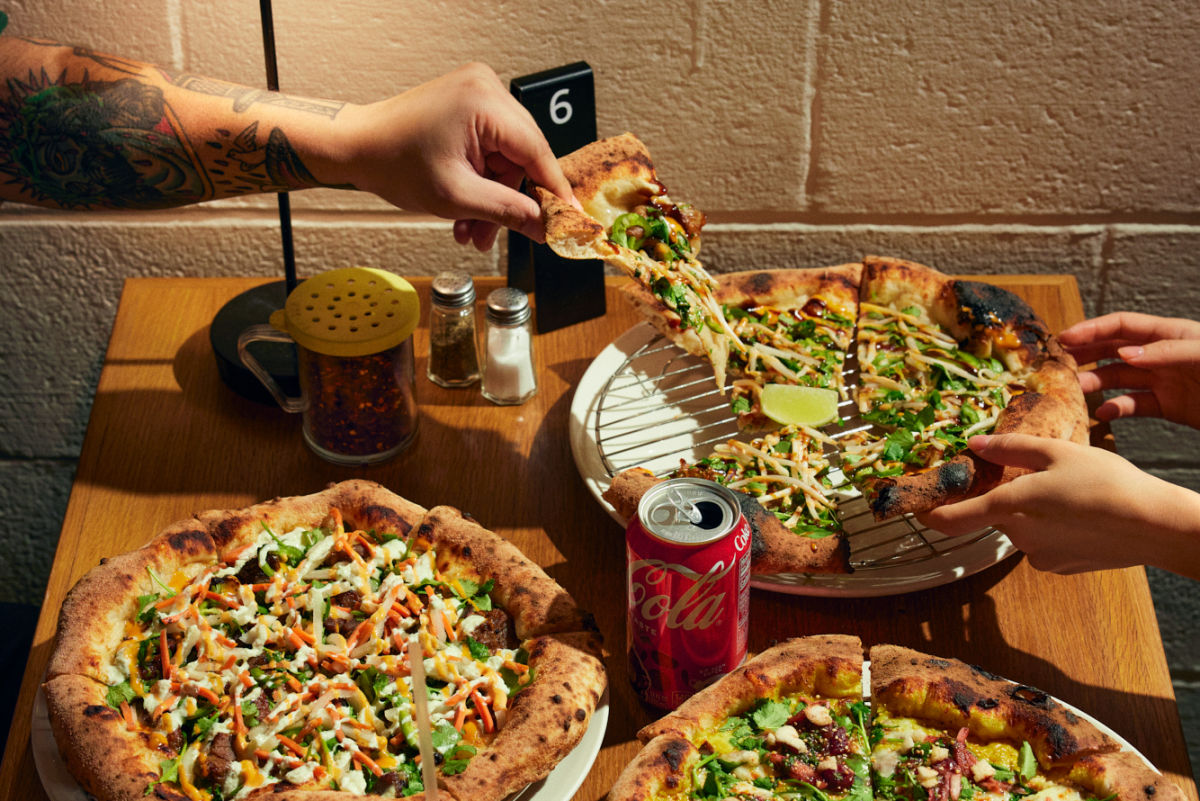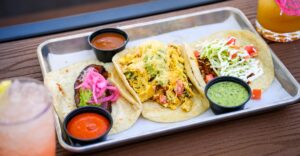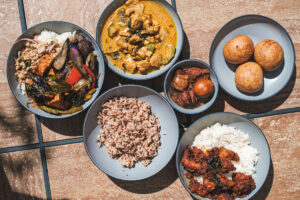Asian Flavors Inspire Some of Beaverton’s Best New Pizzerias

The pies at Hapa Pizza in Beaverton pull culinary inspiration from Vietnam, China, Thailand, and other parts of East Asia.
The pizza slingers at Hapa Pizza begin as many others do: with dough. It emerges crisp-bottomed and leopard-charred from the yaw of the Beaverton restaurant’s brick oven. What lies atop that crust, however, strays far from the standards. Squiggled with sriracha aioli, layered with lemongrass pork, and finished with pickled daikon and carrot, the banh mi pie is the pan-Asian, Neapolitan-style pizzeria’s calling card. Others mix burrata and nuoc cham, or housemade Sichuan sausage and doubanjiang cream sauce.
Once upon a time, pizza in Portland’s western suburbs looked nothing like this. Serviceable slices and thick-crusted rounds at family-friendly parlors were the norm. These days, you can find plush Detroit-style pies with pan-crisped edges at Lazy Days Brewing, and food cart Proof covers the crackery, square-cut crusts of Midwest tavern-style. And at Maiale Rosa Wood Fire Pizzeria, chef Brett Tuft slings detailed, faithful Neapolitan pies that would impress the most grizzled pizzaiolos.
But the scene stands out most for its cross-cultural combination pies pulling from Asia’s expansive culinary lexicon—not as a fad, but as a reflection of the city’s diversity. As Washington County has grown, its Asian American community has grown even faster, setting up Beaverton as an incubator for a burgeoning multicultural pizza world.
Fusion pizza isn’t a new concept. Since the 1980s, Bay Area chefs have melded South Asian flavors with American parlor pies to create Indian pizza or, as it’s more commonly known locally, Desi pizza. Hillsboro is Oregon’s Desi pizza hot spot: Curry & Crust has topped pies with palak paneer and tandoori chicken for more than a decade. The sole Oregon location of growing national franchise Curry Pizza House opened in the same town in 2024.
And it’s popping off in Beaverton, too. The casual, counter-service Bombay Pizza & Curry arrived in 2020, serving wide, medium-thin crusts absolutely stacked with Indian buffet stalwarts. The butter chicken pizza, slick with creamy tomato curry, features chicken, mozzarella, and fresh cilantro confetti, while the chilli paneer pizza balances smoky, marinated paneer and sweet bell peppers. But genius bursts forth in limited-run pies like the Bombay Special, a riot of spiced lamb, caramelized onions, and mint chutney. It may not have a clear counterpart on a thali, but that’s part of the point. Beaverton’s pizza mavens have gone more free-form, using personally significant flavor profiles and ingredients as building blocks for original combinations.
Hapa owners Aaron and Natalie Truong have similarly broadened their approach. The term “Hapa,” or “half” in Hawaiian, refers to individuals of mixed Asian or Pacific Islander heritage, a nod to their approach to pizza. When they started the business in 2019 as a farmers market pop-up, they originally focused on reinventions of beloved Vietnamese dishes: the aforementioned banh mi pizza; a pho pizza with slow-cooked brisket, Thai basil, bean sprouts, and a thickened pho broth sauce. But by the time they opened their restaurant in 2023—and landed on The New York Times’ list of 22 of the best pizzerias in the US in June 2024—the vision had grown.

Beyond the combination of flavors on top, the crust at Hapa Pizza is a thing of beauty, char-speckled in a wood–fueled brick oven.
“Phase one,” Aaron explains, “was translation of Asian dishes onto pizza, but now we’re evolving, creating new dishes, and drawing inspiration from various flavors in Asian cuisine.” A late 2024 pie blended Indonesian-style lamb curry, cranberry jaew (a riff on a Southeast Asian chile dipping sauce), crumbled tamarind shrimp chips, and roasted rice. Their twist on pizza Diavola has the traditional spicy salami (Calabrese), but it also stars jalapeño sambal and a hot and numbing mala honey made with Sichuan peppercorns.
If the crews at Bombay and Hapa have taken a more textbook approach, reimagining specific dishes in pizza form, then Dillon Ikeda has joined them as Beaverton’s postmodern pizzaiolo. Hawaii-born Ikeda is the man behind Chonghi Pizza, a newly launched pop-up embracing pizza as a blank slate. Ikeda was a cook at Canard and Afuri Izakaya before he started working at Hapa. He asked the Truongs if he could stage there, to learn how to make pizza, and they hired him soon afterward. When the Truongs decided to stop selling pies at the Beaverton Farmers Market and focus on the restaurant, Ikeda applied for their market spot. In his first season, he adorned dough with combinations of enoki mushroom, Japanese sausage arabiki, and ninniku zuke, or Japanese soy sauce–pickled garlic. He loaded his Mr. Tone Capone pizza with French onion cream sauce, steak, kimchi, and smoked chile oil. And the namesake pie—with gochujang cream sauce, crumbled sausage, provolone, and soy vinaigrette
onions—evaded any attempt at culinary analogy, following flavor with an adventurous spirit. “It really is a canvas,” Ikeda says. “You can take almost anything and put it on a pizza. It’s limitless.”
Share this content:














Post Comment